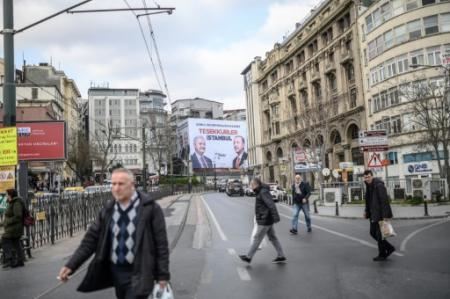
After the municipal elections of last week, Turkey went through a period of four years, with no election planned which will be devoted, has promised the president Recep Tayyip Erdogan, to economic reforms.
The country urgently needs it: the economy faces its first recession in 10 years, the annual inflation, fueled by the erosion of the Turkish lira reached a record level and unemployment has jumped to 13.5% in December, the highest since 2010.
This gloomy picture has significantly contributed to the analysts, the reverse electoral inflicted on the party of president Erdoğan in the local elections of 31 march: according to the provisional results, the opposition won in Ankara and Istanbul.
Investors are now waiting to be reassured by Mr. Erdogan, whose spending and promises of pork –Turkey has voted eight times in five years–, the positions of economic heterodox and the spat with Washington is a concern to the markets.
The Turkish lira remains volatile and analysts said that the head of State must combine measures to support its currency in the short term and structural reforms that will help economic stability in the long term.
The Turkish minister of Finance, Berat Albayrak, stated that Turkey would enter a “period of economic rebalancing”. He must announce Wednesday a series of measures very expected.
According to the Turkish media, it must also confer with officials of the international monetary Fund (IMF) and the world Bank in Washington next week to clarify “the new road map of the Turkish economy”.
“As soon as concerns about the economic difficulties have guided the choice of many voters, Mr Erdogan will be obliged to tackle the underlying problems,” says Amanda Sloat, of the Brookings Institute. “But it has a limited room for manoeuvre,” she says.
– “Permanent Solutions” –
If the president’s party, the AKP, has built its electoral successes since 2002 on a “growth in the chinese”, it is nothing more than a memory.
After rising 7.4% in 2017, the gross domestic Product grew only 2.6% in 2018, with especially two contractions of 1.6% and 2.4% in the last two quarters, which have plunged the country into recession.
These last few months have also been marked by the spectacular collapse of the Turkish lira, which has lost almost 30% of its value against the dollar, fueling an annual inflation of 20%.
“In public discourse, the economic leaders (…) seem to agree on the need for reform,” observes in a note, Maya Senussi, an Oxford Economics. But, “in practice, the recent review of the government is poor”.
But “the authorities must not only admit that mistakes have been made (…), but also show that they are ready to sacrifice growth in the short term to increase the chances of a long-term prosperity,” she continued.
One of the main concerns of the economists regarding the exposure of Turkish companies to foreign debt, the decline of the book added the amounts denominated in foreign currencies to repay.
With no election scheduled until 2023, the period that opens up is an opportunity to find permanent solutions to our structural problems,” said Friday the president of the Union of chambers and exchanges of Turkey, Rifat Hisarciklioglu.
– “Rebuild the trust” –
Since a constitutional reform in 2017, which granted him expanded powers, Mr. Erdogan’s hands are so much more open to reform.
But a major cause of concern for observers is that of the independence of the Turkish central bank, under pressure from the president, who does not hide his aversion to high interest rates, even if these can be used to curb inflation.
A week before the local elections, the Turkish lira has experienced significant fluctuations reflecting the concern of the markets, and we suspect the central bank to have tapped into its foreign exchange reserves –which have suddenly melted– to support the book.
The head of the Turkish State took the investment banks and attributed the recent fluctuations of the pound in a “western” aimed at “cornering” the Turkey.
A cloud-based diplomatic profile in addition to the horizon, with the assumption of u.s. sanctions in the case of the purchase by Ankara of a system of anti-ballistic Russian, a decision that Erdogan said farm.
Wednesday, “Mr. Albayrak has to come up with a program to convince the markets, and especially the Turks themselves, that the current authorities know what they are doing, reconstructing the passage trust,” according to Timothy Ash of BlueBay Asset Management.







